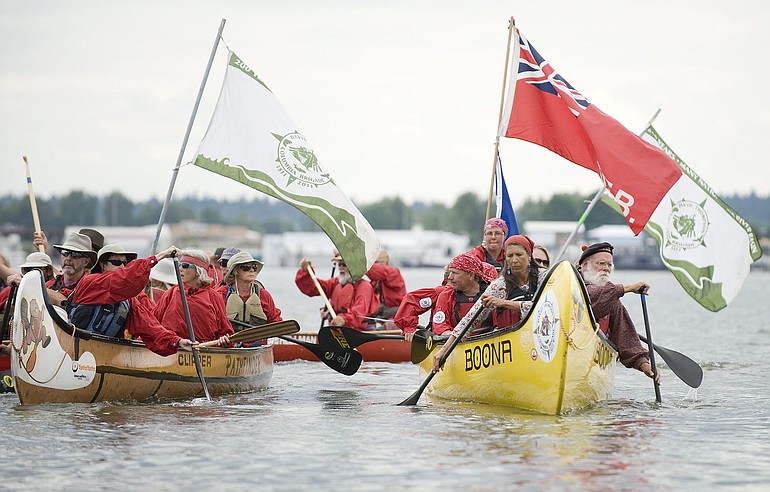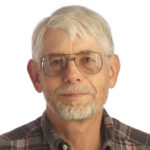It’s been quite a family trip for three generations of the Thompsons, despite a separation of two centuries.
Lavern Thompson and his son, Benjamin, paddled Monday afternoon into Vancouver, leaving them about 100 miles from the end of the route their ancestor charted 200 years ago.
They’re among about 110 members of the 2011 David Thompson Columbia River Brigade who arrived Monday afternoon at Marine Park.
Lavern and Benjamin Thompson are seventh- and eighth-generation descendants of the first man to navigate and map the entire length of the Columbia River.
“I wanted to discover his legacy, and we’ve spent six weeks following the same route,” Lavern Thompson said.
The Toronto resident said he put together the two concepts of family heritage and voyaging a few years ago. He was looking through a canoeing magazine and read about an earlier David Thompson Brigade expedition — the 3,000-mile trip to Lake Superior in 2008.
“I had to be a part of it,” Thompson said after Monday’s arrival in Vancouver, which marks the 939.4-mile point in the voyage.
The group left Invermere, B.C., on June 3 and is scheduled to complete the trip Friday at Astoria, Ore., where there will be a wind-up celebration Saturday.
Patricia Senecal of Rossland, B.C., is one of the voyagers who’s been with the brigade from the start. It hasn’t been too tough, she said.
“I ski all winter, and I trained for this, including lifting weights,” Senecal said.
“They also planned it so we wouldn’t have such long days on the water. A lot of us are over 55 or 60,” Senecal, 55, said.
The brigade is averaging about 30 miles a day. Today is a day off. People who want to meet the voyagers are welcome to come by Marine Park today and talk with the paddlers about the journey, but there won’t be any canoe rides or historical presentations for the public.
The group plans to hit the river again Wednesday as early as 5 a.m. — before the wind picks up — for the 35-mile paddle to Kalama. The brigade is scheduled reach a campsite west of Longview Thursday afternoon.
Most local folks are much more familiar with the exploits of Meriwether Lewis and William Clark, who reached the Columbia River in 1805 at what’s now the Tri-Cities.
“David Thompson and Lewis and Clark were apples and oranges,” Ross MacDonald, brigade chairman, said. “David Thompson was about trade and ongoing relationships. Lewis and Clark were driven by sovereignty as much as anything else.”
MacDonald said that Thompson’s “legacy was putting the Columbia River on the map as the last leg of the Northwest Passage, which people had sought for 200 years, connecting the east coast of what is now Canada with the Pacific,” he said.
“As a land surveyor, Thompson was unequaled in North America — and probably the world,” MacDonald said. “He mapped one-sixth of the continent with unprecedented accuracy.
“The best quote I’ve heard about him,” MacDonald said, “is that he was a God-fearing GPS unit.”




